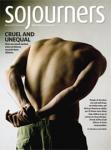Last week the body of a young woman was found near my house. She was 17 years old. She'd been murdered. The garbage men reported finding her in a supercan in the alley. For a few days she had no name. Now I know her name was Ebony Franklin.
Ebony took a bus from her dad's apartment in my neighborhood to her mom's on the other side of town. She never made it home.
How do we make sense of something senseless? In the days following, I prayed about Ebony's murder. I read the news reports. I prayed for her family and whoever killed her. I tried to find order in the chaos of violence. There's none to be found.
And yet. It is one of the corporal works of mercy to "bury the dead," one of the spiritual works of mercy to "pray for the dead." It is counted as a righteous act. It is an act of justice. Because what we mourn when Ebony Franklin's body is found in a garbage can is the loss of a "way" of life, a value system that holds human dignity as sacred.
The prophet Jeremiah best exemplifies the conflict between dreaming the world as God intends and staring into a body bag holding a child. Grieving, in Jeremiah, is a public act of resistance. It resists the "royal consciousness," to use Walter Brueggemann’s phrase, which would have us believe these things just happen.
"Royal consciousness leads people to numbness," writes Brueggemann, "especially to numbness about death." Numbness occurs when one’s passion is stolen. Literally, it means the removal of one's ability to articulate and claim one’s own suffering.
When we are numb, we behave as others expect us to behave. We let experiences be sold to us as pre-packaged events. But, reminds Jeremiah, it is our ability to claim our own suffering -- our public grieving, our "praying for the dead" -- that enables us to recognize that we are made in God's image, not in the image of empire.
Matthew's gospel cites Jeremiah: "A voice was heard in Ramah, sobbing and loud lamentation; Rachel weeping for her children, and she would not be consoled, since they were no more" (Matthew 2:18). Why was Rachel inconsolable?
The great Torah scholar Rashi quotes a midrash saying that Rachel died "by the way." In Hebrew, it means in "no place," in the liminal space between one named place and another. Not unlike Ebony Franklin -- left in an unnamed alley between Fairmont and Euclid streets.
The midrash honors Rachel as the mother of many. It also teaches that there is "no place" where her children may be forced to go where she will not be with them.
When Herod murders the children in Bethlehem, as Matthew describes, because the Infant King of the Jews was not handed over to him by the magi, Rachel's wailing rises up. And why will she not be consoled? Because justice has not been served. Rachel will scream and mourn and cry out -- driving Herod mad -- until there is accountability, both from God and humanity -- for every dead child.
But Matthew and Jeremiah don't lift up Rachel just because she is a mother demanding justice. Her actions are the catalyst for hope. Her wailing dismantles the architecture of apathy. She won't be bought out by the thin balm of "murder rates" and statistics. She will put before the people that all is not well. That there is a sickness in the society that only God can heal.
In the week after Ebony was murdered, I walked down the street to the alley where her friends held a vigil the night before. A white T-shirt was tied to a telephone pole with the words "RIP Ebony" on it in black marker. Stuffed animals and melted candles were scattered around the base.
In Common Prayer: A Liturgy for Ordinary Radicals (Zondervan, 2010), there is a prayer for the "Death of Someone Killed in the Neighborhood" pleading to God "for the unbearable toil of our sinful world." I shoved a folded-up copy of that prayer into a crevice in the bricks behind the pole -- and prayed not to be consoled.
Rose Marie Berger, author of the book Who Killed Donte Manning? (available at store.sojo.net) is a Catholic peace activist and a Sojourners associate editor.

Got something to say about what you're reading? We value your feedback!